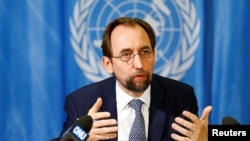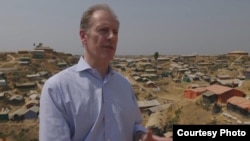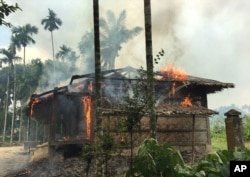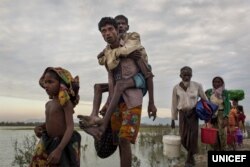The highest-ranking United Nations human rights official has called for alleged crimes committed against Myanmar's Rohingya Muslim minority population to be assigned to the International Criminal Court for prosecution.
U.N. High Commissioner for Human Rights Zeid Raad al-Hussein referred allegations of atrocities to the ICC at a Friday news conference in Geneva.
"There are strong suspicions, yes, that acts of genocide may have well taken place, but only a court, having heard all the arguments, will confirm this," said Zeid, who previously described the Myanmar government's actions against the Rohingya as a "textbook case of ethnic cleansing."
Myanmar has prohibited U.N. investigators from entering the country to investigate. On Monday, a U.N. fact-finding mission is scheduled to report its initial findings that are based on interviews with victims and other survivors in Bangladesh and other countries.
A senior U.N. human rights official urged the international community Thursday to maintain pressure on Myanmar's government to halt atrocities against the Rohingya and facilitate their return home.
"Clearly, there has to be sustained international pressure on the government of Myanmar to prevent its security forces from carrying out the actions that they are carrying out," Assistant Secretary-General for Human Rights Andrew Gilmour told VOA on Thursday. "And to enable, to genuinely, not just say it, but to genuinely permit the conditions for the refugees to return."
Gilmour returned this week from a four-day visit to Cox's Bazar in Bangladesh, where nearly a million Rohingya Muslim refugees are living in what has become the world's largest refugee camp.
Some 700,000 Rohingya have fled Myanmar since August 25, after attacks by Rohingya militants on state security forces led to military reprisals that the United Nations says were executed in a well-organized, systematic and coordinated manner.
'Forced starvation'
Survivors and witnesses have given harrowing accounts of security forces killing and raping Rohingyas while looting and burning their villages in northern Rakhine state. The Rohingya are one of many ethnic minorities in Buddhist-majority Myanmar. They are considered to be economic migrants from Bangladesh and have been denied citizenship in Myanmar, even though most can show that their families have been in the country for generations.
Gilmour said the Rohingya who have not left Rakhine are now being deprived of food.
"It's a policy of forced starvation," he said. "And it is a crime against humanity."
He said aid agencies have had no access for months to Rakhine. Farmers have had their fields confiscated by the authorities and their animals have been stolen or killed. In other cases, Rohingya are prevented from leaving their villages — sometimes even their homes — to prevent them working so they can buy food. Their dire circumstances are forcing many who remained after August to flee now.
No UN access
The United Nations has had little success getting into Rakhine.
"Since June, we've not had one single person allowed there by the Myanmar government," Gilmour said.
A fact-finding mission set up by the U.N. Human Rights Council has not gotten in, and the government dismissed a request last month from the Security Council to visit, saying it was "not the right time."
"There is clearly a lot to conceal going on and the concealing is happening," Gilmour said.
He said for now, the right conditions "clearly do not exist" for the Rohingya to return home in a safe and voluntary manner.
Until they can, he stressed that there must be adequate international support for Bangladesh, which is hosting the refugees.
Work is also being done to document the human rights violations that have been perpetrated against the Rohingya.
The U.N. Human Rights office is deploying a team to Cox's Bazar to collect testimony from survivors.
Gilmour is also urging that in addition to the fact-finding mission, an independent international investigative mechanism should be set up to look into individual accountability. A similar mechanism is in place for crimes committed in Syria.
United Nations Correspondent Margaret Besheer contributed to this report.















